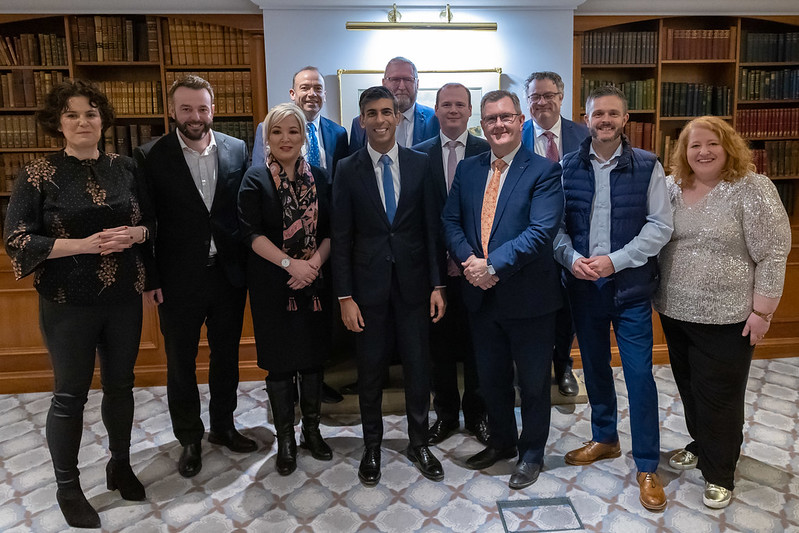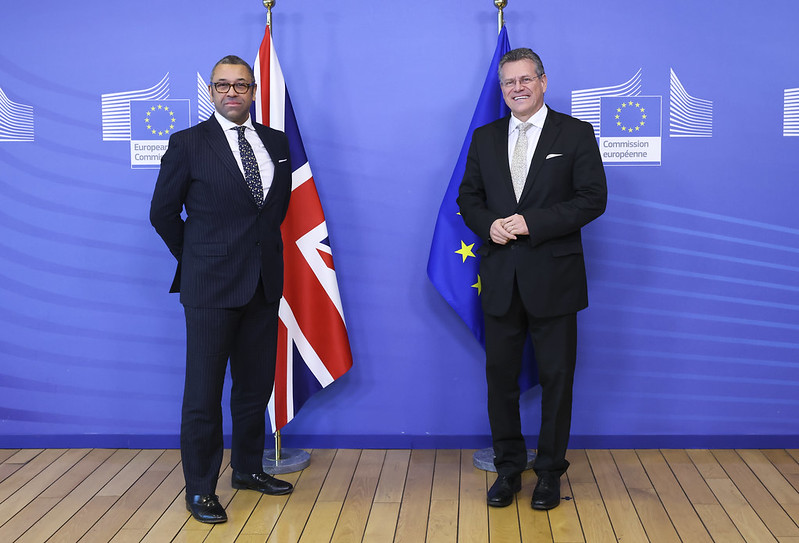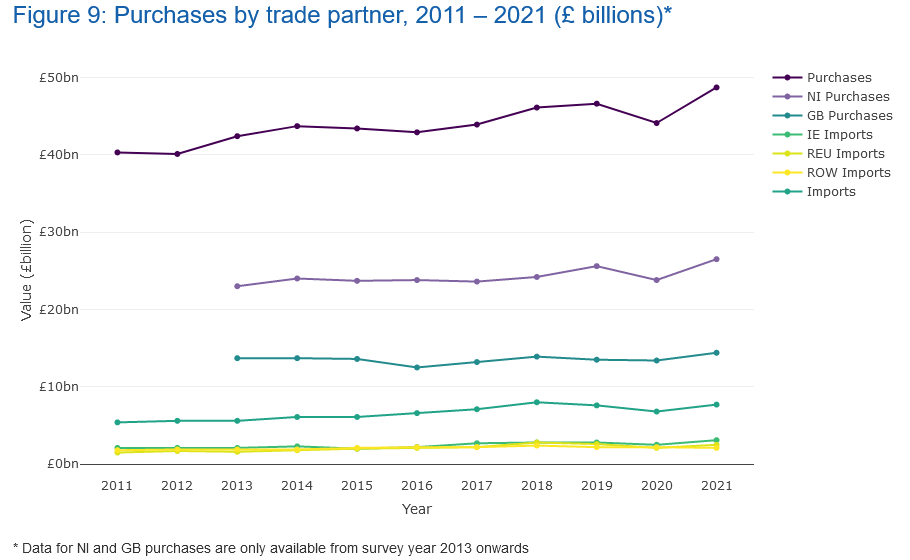Brexit & Beyond Newsletter
20 December 2022
Merry Christmas and Happy New Year to all our readers!
This week’s newsletter considers some of the issues to look out for in the new year. The Prime Minister visited Northern Ireland at the end of last week, while UK Foreign Secretary James Cleverly had his first face-to-face encounter with European Commission VP Maroš Šefčovič. Trade statistics on Northern Ireland’s first year operating under the Protocol have been published. The High Court has ruled that the instruction from the former Agriculture Minister to halt checks at ports in NI was unlawful. The European Commission has extended the grace period for veterinary medicines.
What to watch out for…
A Protocol deal?
Will the EU and UK reach a deal on the Protocol? The 25th anniversary of the Good Friday Agreement will fall in April next year and there is an impetus from both the UK, and the EU to get a resolution, and a restored Executive and functioning Assembly by this point. Between reports that the UK Government have put the Northern Ireland Protocol Bill on ice (although the Foreign Minister has suggested otherwise, as below), the EU not pursuing its infringement proceedings against the UK, and repeated remarks about positive “mood music” (if not concrete progress) in the EU-UK relationship, there is at least potential for progress on the matter. Charles Grant, Director of the Centre for European Reform, tweets about his optimism regarding a timely deal on the Protocol, saying both EU and UK “see an opening for the outlines of a deal by around the end of February.”
NI institutions
Meanwhile, the UK Government passed the Northern Ireland (Executive Formation etc) Act to extend the deadline for the NI Executive to form. The next deadline for the parties to form an Executive is 19 January 2023. If not, as things stand, an election would be held on 13 April at the latest. The Guardian reports that the EU and UK are aiming to reach a basic agreement by mid-January, ahead of this deadline.
Post-Brexit regulation
How will the UK Government use its new post-Brexit powers? The Times has reported that the PM has decided to bring back the Brexit Opportunities Unit to manage the conversion of retained EU law into domestic legislation. We’ve highlighted that some organisations have concerns about the Retained EU Law Bill regarding environmental protection, parliamentary scrutiny, and legal (un)certainty. We will continue to update you on its progress through Parliament. There have been some reports that the PM may reconsider the timeline for the “bonfire” of EU regulations.
Varadkar as Taoiseach
Ireland has a new Taoiseach in Leo Varadkar, who has swapped roles with Micheál Martin under their coalition agreement. Varadkar was previously Taoiseach from 2017 to 2020, when the Protocol was negotiated between the EU and UK. Martin becomes Minister for Foreign Affairs. Leaders of local parties have commented on the development. UUP leader Doug Beattie said, “[Varadkar’s] contribution during his first term, particularly when it came to Brexit and the Protocol, was not positive and I hope to see early indication that he has learned and matured on these particular issues in the intervening years.” DUP leader Sir Jeffrey Donaldson said, “During his tenure as Taoiseach Micheál Martin sought to understand why unionism was wholly opposed to the NI Protocol. I encourage Leo Varadkar to follow Micheál Martin’s example in managing North-South relationships.” Naomi Long, Alliance leader said, “Leo Varadkar’s previous term as Taoiseach allowed for the fostering of good relations north and south, and I am confident that will continue.”
EU-UK divergence
We can expect EU-UK regulatory divergence, and its consequences for NI, to continue to be a theme in the coming months and years. One example of this is the EU’s Carbon Border Adjustment Mechanism (CBAM); the European Parliament and EU Council reached a political agreement on this last week. CBAM would impose a carbon emissions levy on goods imported to the EU, similar to that paid by domestic producers under the EU’s Emissions Trading System (ETS) price. As reported in our 28 November newsletter, experts say these arrangements, which would apply under the Protocol, could prove to be very difficult. Giving evidence to the House of Lords European Affairs Committee in November, Adam Berman, Deputy Director of Energy UK, explained, “The UK would be obliged to discuss with the EU how the CBAM might be applied in Northern Ireland. Because we have this issue where power in Northern Ireland is covered by the EU emissions trading system, but everything else—so most of the stuff affected by the CBAM—is covered by the UK emissions trading system, the CBAM would apply to Northern Ireland, which would constitute a significant regulatory barrier for companies in Northern Ireland wishing to trade with the Republic of Ireland.”
We’ll keep you up-to-date on how such issues are managed by the EU and UK.
Prime Minister visits Northern Ireland
Rishi Sunak visited Northern Ireland for the first time as Prime Minister and met with the leaders of Northern Ireland’s five main parties. The Secretary of State for Northern Ireland Chris-Heaton Harris also held talks with the leaders last week regarding the restoration of power-sharing. The PM’s discussions with the politicians covered the Protocol, as well as current issues including the £600 energy payment for households in NI, and the nurses’ strike.

The Prime Minister meeting political leaders in Northern Ireland | Source: Simon Walker / No 10 Downing Street
The BBC reports comments from NI party leaders following the meeting: DUP leader Sir Jeffrey Donaldson said the PM had given indications that talks with the EU on the Protocol are likely to intensify. He said that it was not a question of how long the negotiations took, but about getting it right. He also suggested the EU needed to be more flexible. Sinn Féin's Michelle O'Neill said that "more than warm words and good mood music" was required to settle the Protocol dispute. Alliance leader Naomi Long said, “"We don't want a deal [on the Protocol] that will cause further problems down the line.” SDLP MP Claire Hanna said they were “going through the motions” at the meetings with the PM and Secretary of State and said there was “scant information about the government’s negotiations with the EU around the Protocol”. UUP leader Doug Beattie said it was “disappointing” that they didn’t get an update on EU-UK negotiations.
Minister Cleverly and VP Šefčovič meet face-to-face
UK Foreign Secretary James Cleverly and European Commission Vice-President Maroš Šefčovič met in Brussels on Thursday 15 December. This was their first in-person meeting after regular contact via telephone. Minister Cleverly tweeted, “We are determined to find a solution to the Protocol that, above all else, protects the Belfast (Good Friday) Agreement.” Šefčovič called the meeting “constructive”, tweeting, “We are determined to find joint solutions that work for people and businesses in Northern Ireland, protecting the Good Friday (Belfast) Agreement. I want us to make the most of this window of opportunity.” EU and UK officials continue to engage.

UK Foreign Secretary James Cleverly meeting with European Commission Vice-President Maroš Šefčovič in Brussels | Source: Rory Arnold / No 10 Downing Street
Minister Cleverly took questions in the Commons on Tuesday 13 December, contradicting suggestions that the NI Protocol Bill is paused. Cleverly said the Bill “exists for a reason”. He said he has made a commitment to Šefčovič that the Government “would not either artificially accelerate that process or artificially hinder or retard it.” He went on to reiterate that the UK’s preferred option is to resolve the issue through negotiations, saying, “We speak regularly, the tone is positive, and I think that there is now an understanding that the concerns that we have raised, and that have been raised particularly by the Unionist community in Northern Ireland, are not confected but real, and that any agreement would need to address them.” He called negotiations with the EU “well-tempered” and said that if there were an easy resolution, “it would have been done already”.
Questions to the NI Office
On Wednesday, Ministers in the Northern Ireland Office were at the dispatch box taking questions from MPs. The absence of the power-sharing institutions was raised. Secretary of State for NI Chris Heaton-Harris told the Commons, “We remain of the view that there is no excuse for the Northern Ireland parties not to be in government as soon as possible.” He said he wouldn’t give a running commentary on ongoing talks between the EU and UK. Asked whether he could commit that a deal will be reached by April 2023, Heaton-Harris said suggested, “I think we should be more glass-half-full about the opportunities of a negotiated settlement to the Protocol issue.” Other matters raised include the recently published NISRA trade statistics (see below), the cost of the Trader Support Service, NI’s place in the UK internal market, and the difficulties in importing seed potatoes from Scotland to NI, which NI Office Minister Steve Baker called “absurd”.
Electronic Travel Authorisation
SDLP MP Claire Hanna asked about the UK’s new Electronic Travel Authorisation’s (ETA) impact on NI tourism. Under the Nationality and Borders Act, a new requirement will be introduced for overseas visitors to the UK to have an ETA. This will not apply to citizens of Ireland or the UK. The ETA scheme is due to be rolled out in January 2023 and should be fully in place by the end of 2024. Minister Baker said the Government is engaging on the matter and said, “There is evidence from schemes in other countries that tourism will not be adversely affected.” Labour’s Tonia Antoniazzi told the Commons that 70% of overseas visitors to Northern Ireland arrive through Dublin and referenced comments from the chief executive of the Northern Ireland Tourism Alliance, who fears that the new system potentially puts a quarter of NI’s tourism business at risk. The Minister responded, saying that “clear communication is what is needed to make sure that people meet the requirements to enter the UK”.
The Northern Ireland Human Rights and Equality Commissions have also raised concerns about the ETA provisions in the Nationality and Borders Act, highlighting the potential impact on certain people, particularly those living in border communities. The NIHRC recommended that that all journeys into Northern Ireland originating from Ireland should be exempt from the ETA requirements.
NISRA publishes trade figures for 2021
The Northern Ireland Statistics and Research Agency (NISRA) has published its annual report on NI businesses’ trade for 2021, the first year Northern Ireland businesses operated under the new trading arrangements in the Protocol on Ireland/Northern Ireland. Some businesses and politicians have highlighted issues and increased friction in trade from GB to NI, as a result of the increased paperwork, checks, and controls. For example, in May 2022, the Consumer Council published an overview of GB retailers not delivering to Northern Ireland. It said it was aware of 119-132 businesses not delivering to Northern Ireland (119 had confirmed that this is due to Brexit).
NISRA’s figures show that overall, there was an increase in exports of goods, with some estimated total sales worth £51.3 billion in 2021, an increase of 13.8%. Goods imports from GB increased 7% from £13.4 billion to £14.4 billion. GB remains the most significant single market for NI businesses’ exports, accounting for 16.6% of total sales. Exports from NI to both Ireland and GB increased during this period: exports to Ireland increased by 23.0% to £5.2 billion, while exports to GB were up 13.1% to £12.8 billion. Exports to other EU countries increased by 16.8% to £2.6 billion.

NISRA data on the value of purchases from each trade partner 2011-2021 | Source: NISRA
The figures are not adjusted for inflation. The BBC’s Business and Economics editor has more context and analysis on the statistics. The Commons Library has published a research briefing on UK trade with Ireland, including NI’s trade with GB and internationally.
High Court rules decision to halt GB-NI checks ‘unlawful’
The High Court in Belfast has quashed the instruction to cease checks on animals and agri-food goods entering NI from GB, which was issued by then Minister for Agriculture, Environment and Rural Affairs Edwin Poots in February 2022. This was shortly before the DUP withdrew its First Minister from office. Under the Protocol, EU rules on customs and regulation of agri-food products apply to goods arriving at ports in NI. The checks and controls are set out in the EU Official Controls Regulations, and are carried out by the Department of Agriculture, Environment and Rural Affairs.
The Minister had previously contended that he required Executive agreement for the implementation and continuation of checks. The court found that this was not the case “because the requirement to carry out the OCR checks [EU Official Controls Regulation] is a statutory obligation imposed on the Minister...Under domestic law, DAERA have the legal responsibility for complying with the OCR.” The court’s summary judgement states that its duty to interpret national law in accordance with the UK’s treaty obligations is “well-recognised and longstanding.” The court found that the Minister and DAERA are therefore “under a legal statutory obligation to implement the checks on goods entering NI from GB in accordance with the requirements of the Protocol.” The court declared the instruction was “unlawful and of no effect”.
EU extends grace period for veterinary medicines
The grace period for full application of EU rules on veterinary medicines in Northern Ireland under the Protocol was set to end on 31 December. This caused concerns that an estimated 51% of veterinary medicines could no longer be available in NI. Yesterday, the European Commission announced it is extending the current arrangements to December 2025. European Commission Vice-President Maroš Šefčovič said doing so would give “ample time to adapt”. He remarked that this “underlines [the EU’s] genuine commitment to engaging constructively with the UK to find agreed solutions around the Protocol. I therefore hope that we can carry today's positive announcement into other areas of our discussion.” UK Foreign Minister James Cleverly welcomed the announced.
Local parties in NI reacted to the announcement. Sinn Féin MLA Declan Kearney welcomed the news, saying “Once again this demonstrates the EU's commitment to delivering practical solutions to ensure progress on the Protocol. The British Government must show similar flexibility.” DUP MP Carla Lockhart said that the grace periods are “only sticking plaster solutions. This whack-a-mole approach must stop…What we need urgently is the EU and our Government to find a new agreement that addresses these intolerable restrictions on the flow of goods within the UK.” Alliance MLA Patrick Brown said he was “relieved”, but warned a long-term solution needs to be found. SDLP MLA Patsy McGlone said the extension of the grace period would be “warmly welcomed” by vets and the agriculture sector. He went on to say, “It is clear the EU is willing to compromise to do what’s right for people here and the British government must meet them halfway.”
Other news
- Joe Kennedy III has been appointed US Special Envoy to Northern Ireland for Economic Affairs.
- The journal Northern Ireland Legal Quarterly has published a collection of articles on Northern Ireland’s Legal Order after Brexit.
- The UK has signed an agreement on offshore renewable energy cooperation with EU and North Seas countries, which fulfils commitments in the EU-UK Trade and Cooperation Agreement on developing renewable energy projects in the North Seas.




